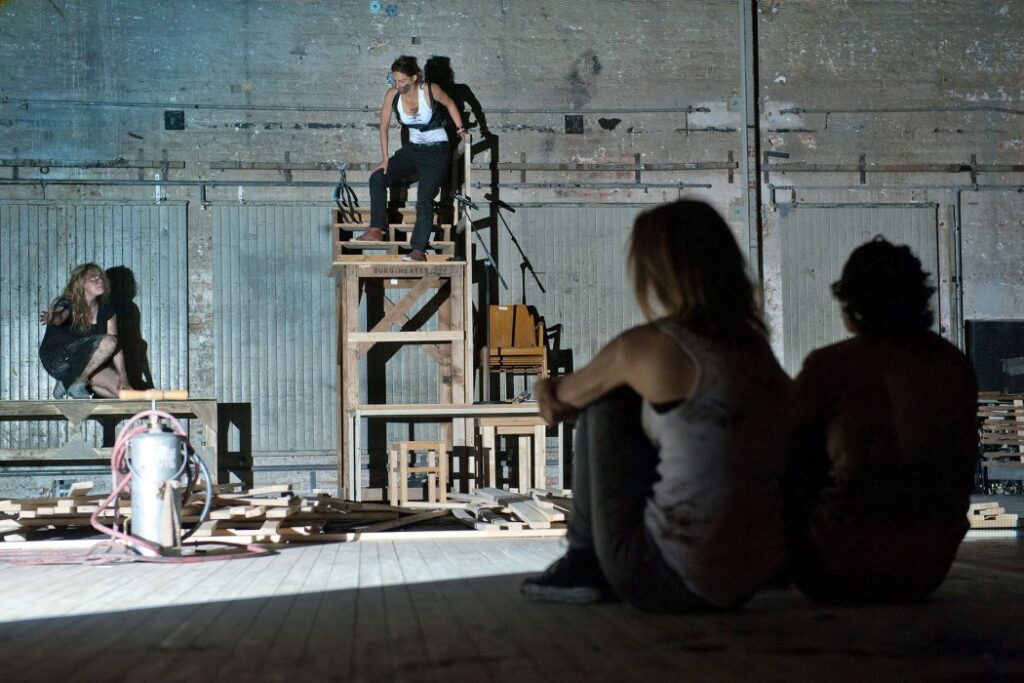Note: I know Theatertreffen is over, and that „Die lächerliche Finsternis“ closed already. But sometimes our thoughts need time to marinate. #betterlatethannever
Intermissions can be deadly. Welcome, for sure—we all have to pee sometimes, or buy an overpriced Laugenbrezel—but they can stall a show’s momentum, for the performers as well as for the audience.
Not so in this Burgtheater production of Wolfram Lotz’s “Die lächerliche Finsternis” (“The Ridiculous Darkness”). Here, director Dušan David Parízek elevates intermission into something glorious. A wall of tall wooden beams has just fallen, making an earsplitting smack against the stage floor. The back wall of the stage is bare. Projected onto it: “20 Min. Pause, wenn Sie wollen.” “20-minute intermission, if you want.”
The house lights go up, but a show continues onstage. To the tune of “The Lion Sleeps Tonight,” the four actresses, wearing work gloves and safety goggles, feed the long planks into a wood chipper. Sawdust floats through the air. Audience members approach the stage to snap photos. Rather than feeling like we’ve been awkwardly ejected into the lobby, we’re lured back into the auditorium—to watch as the theater is destroyed before our eyes.
Blunt metaphor? Perhaps. But until wood chippers become de rigueur on theater stages, I won’t complain. And especially not when everything surrounding this intermission is so rich. “Die lächlerliche Finsternis” is literary but visceral, poignant but bawdy, overflowing but not overstuffed. It’s a weird wonder of a play, and Parízek realizes it masterfully.
In his text, the 33-year-old Lotz draws from „Heart of Darkness“ and „Apocalypse Now“ to follow two German soldiers sailing up the Hindu Kush (yup), searching for a mutinous colonel who allegedly killed two of his comrades with a lawn chair (indeed). This, obviously, is a twisted world, and it grows only more bizarre as the soldiers venture deeper into it, meeting an Italian UN peacekeeper overseeing mineral extraction for mobile-phone production, a leering missionary, a talking parrot and a Balkan war refugee selling lactose-free goat cheese, dental floss and investment funds.
It’s a comment on the Western inability to understand faraway war zones—in our minds, the Congo and Vietnam and Iraq and Afghanistan are interchangeable. Globalization may have made the word seem smaller, but that doesn’t mean we’re any more knowledgeable about it. It’s also a comment on the limits of representation in the theater. How do we create unfamiliar worlds on the stage? What sorts of rules apply? Who can play whom? (That was an overriding theme at this year’s Theatertreffen, as in “Die Schutzbefohlenen,” “Common Ground” and even “Das Fest.”)
Parízek goes about this in a canny way. For one, he’s cast four women—a phenomenally dynamic quartet—to play mostly male roles. As hardboiled Sergeant Pellner, Catrin Striebeck slaps on a mustache and patrols the stage with a pelvis-first swagger. Frida-Lovisa Hamann plays the good-hearted Corporal Dorsch with sympathy and a strong Saxon accent. Dorothee Hartinger and Stefanie Reinsperger, meanwhile, move through the rest of the roles with remarkable agility. Reinsperger begins the show with a fusillade of a monologue: She plays a Somali pirate explaining his path to high-seas swashbuckling, and she does this with a beautifully broad Viennese dialect, stretching her words like rubber bands to the point of snapping. It’s utterly incongruous but Reinsperger pulls it off with élan, and it’s an opening that immediately establishes “Finsternis” as a production that shouldn’t work but somehow does. Hartinger, meanwhile, does a bang-up job as the UN peacekeeper, taking on an Italian accent so springy and elastic that the words seem to do somersaults out of her mouth.
Lotz wrote “Finsternis” as a radio play, which Parízek also handles well. He keeps the staging fairly simple (unlike the Deutsches Theater production, which is a slapsticky parade of distracting costumes, huge set pieces and endless banana consumption) and has set up a lo-fi Foley station to one side of the stage, where the performers create the sounds of the rainforest. This allows Lotz’s offbeat images—death by lawn chair, a sheet metal stovepipe used as a prosthetic leg and so on—to blossom, unhindered, in our heads.
“Finsternis” has its moments of despair and rage. But what most stunned me about the play, and what has continued to sit with me—preventing me, ahem, from getting this online while the festival was still running—is its belief in possibility. “We don’t have to believe it because it’s true!” shouts one of the performers. That’s essentially the thesis of Lotz’s “Rede Zum Unmöglichen Theater,“ „Speech On The Impossible Theater“ (my favorite line: “We no longer want to eat the little sausages of truth that have been fried for us“). Just because something is impossible doesn’t mean it’s impossible. That’s meaningless, but just because something is meaningless doesn’t mean it’s meaningless. Do you follow? And just because Lotz is skeptical about the theater, and about its ability to reflect or represent reality, doesn’t mean he can’t make people laugh—and with full, throaty, genuine roars. Sometimes about anuses.
So where some see cynicism in “Finsternis,” I see hope. The name of the pirate’s boat, after all? “Hoffnung.”
Die lächerliche Finsternis
von Wolfram Lotz
Regie und Bühne: Dušan David Pařízek
Dramaturgie: Klaus Missbach
Mit: Frida-Lovisa Hamann, Dorothee Hartinger, Stefanie Reinsperger, Catrin Striebeck
